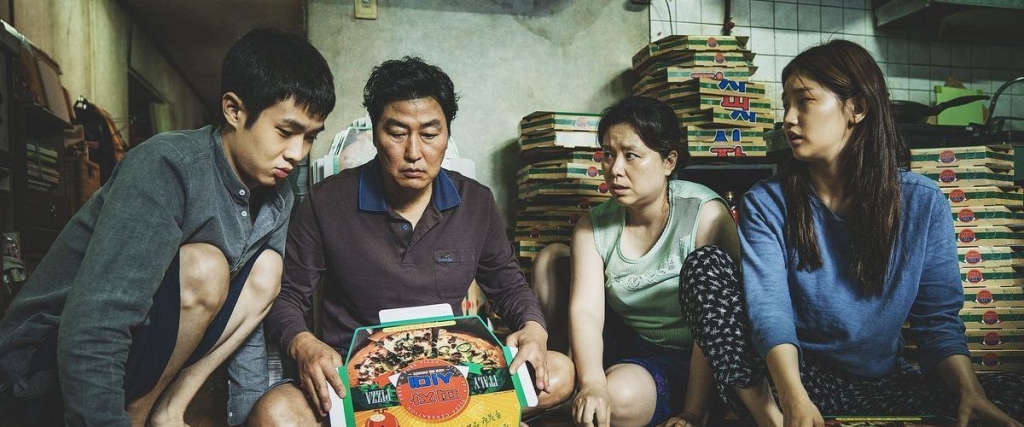Man, the new movie by the guy who directed Snowpiercer is really picking up steam!
…get it? Picking up steam? Because it’s from the same director who did Snowpiercer? The movie about the train that never stops? Get it?
Ah, never mind…
If I had to guess, I’d say that Parasite is a very different kind of movie than what most ‘Murican audiences will be used to from Bong Joon-ho. While he’s done drama before – Barking Dogs Never Bite and Mother – over here, his most popular films are his genre pieces. Films like The Host, his take on Godzilla, Okja, which is more fantasy than anything, or the aforementioned Snowpiercer, which is all about a magical train that goes around and around the world, forever and ever…suffice it to say, I can easily imagine a scenario where someone goes into a movie called Parasite, knowing it’s by the guy who made all those films, expecting another dip into sci-fi and horror, and getting what appears to be a straight-up drama instead. There are parasites in this movie…but they’re all very human.
Parasite has to do with a downtrodden, out-of-work family of four. We see in the opening scene that they in such squalor that, when a fumigation crew starts dusting the street outside, they decide to leave the window open to get rid of their roach problem. For free! Things take an interesting turn, however, when a friend of Ki-woo – the son in the family – asks him to fill in as a tutor to the daughter of a rich family. Ki-woo obliges, but soon into his first day he senses an opening for his sister, Ki-jeong, to join him as an art tutor for the rich son. Never mind that she doesn’t know the first thing about art, and doesn’t have any credentials; nothing a bit of light forgery can’t fix. Once she’s there, though, she starts looking for positions for her parents. The other jobs around the household are already taken by other people, but if something were to happen to them…
Doesn’t sound much like Snowpiercer, does it? But make no mistake; Parasite comes from the same mind. For one thing, despite all appearances, it’s very fluid, genre-wise. It defies simple characterization, which I always like (I’m generally of the opinion that genre restrictions are stupid). It begins as a satire, before hardening into straight drama, then back into comedy, before elements of horror start to creep in, and then…I’d better not say. But Bong Joon-ho is always in complete control; I never felt that he was just throwing whatever he wanted at the wall, and seeing what stuck. There was a purpose to the tonal shifts, and the end result was a film experience that I couldn’t predict the end of, or even the next scene of.
But the main clue that this is a Bong Joon-ho picture is the recurring theme of class warfare. I’m bringing up Snowpiercer a lot in this review, and there’s a reason for that, beyond the fact that I love it. Snowpiercer isn’t just a movie about a train endlessly circling a desolate, frozen earth; it’s a movie about the way the train divides its passengers into different cars based on their wealth and social status, and the eventual armed revolution by the have-nots against the haves.
Parasite isn’t as fantastical as Snowpiercer, or even Okja, but it absolutely deals with the same themes. Weirdly, Parasite serves as a kind of spiritual relative to Jordan Peele’s Us from earlier this year. They’re both comedy-drama-horror hybrids that start out as one thing, before slowly transitioning into a parable about the lengths the disenfranchised will go, not only to survive, but to get back what they think they’re owed. There’s something almost supernatural about the way the family systematically attaches themselves to the rich family; watching them at work, they almost could be seen as the tethered.
It works, though, for two main reasons. The first, it’s never moralistic, or heavy-handed. The themes are right there, but you do have to work for them. The social satire of the movie mostly comes up through contrast; for instance, when there’s a downpour about midway through the movie, the poor family (I refer to them as such because we never get any last names) has to worry about their little hovel flooding. The rich family, by contrast, spend the whole day post-flood commenting on how lovely their wet grass looks, which irritates the poor family to no end.
The second reason is much simpler; it’s just wildly entertaining. There are sequences so brilliantly put together, the audience I saw this with was simultaneously screaming and in stitches. This is a prime example of a film that deals with heady subjects dead on, while still maintaining a high entertainment value.

